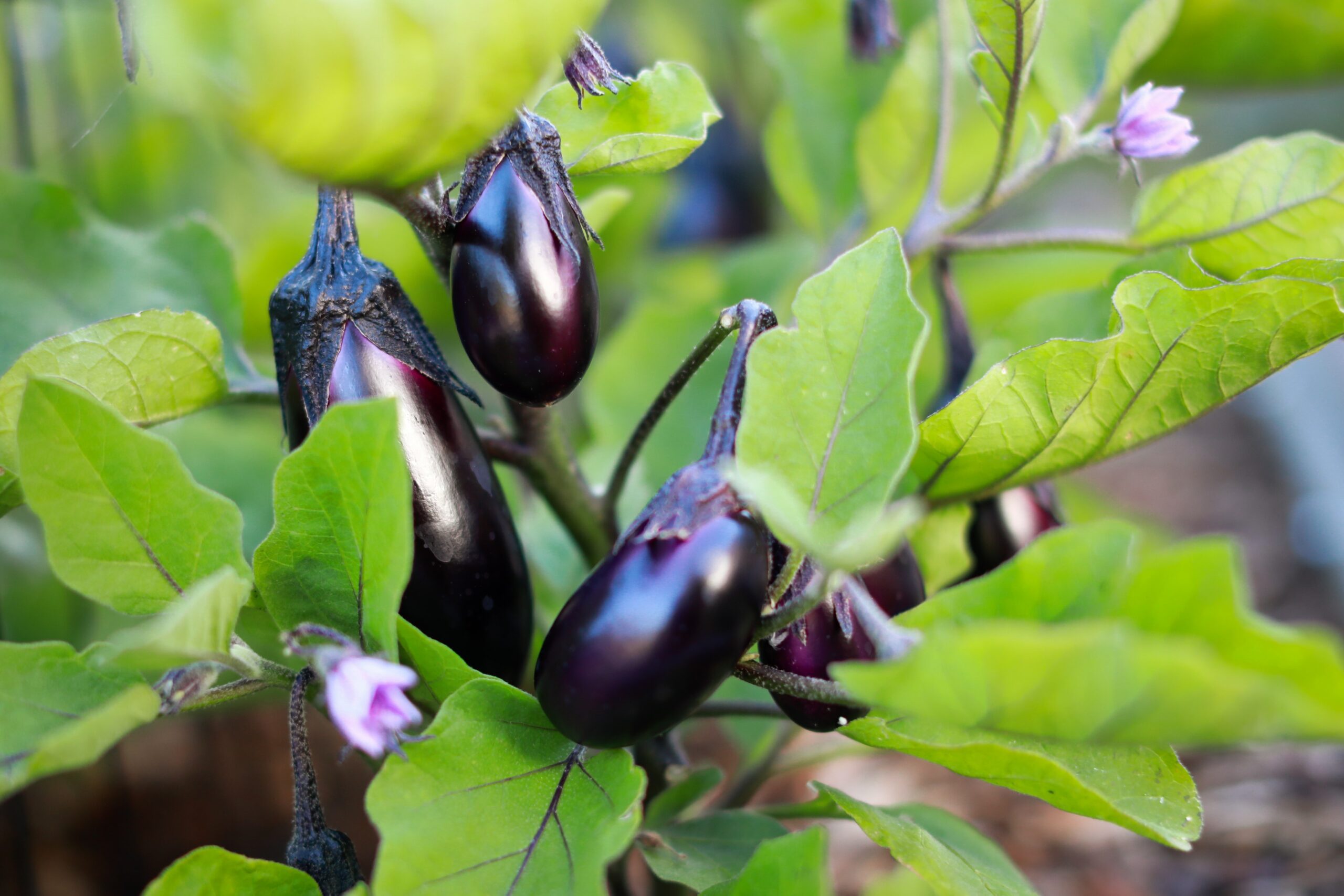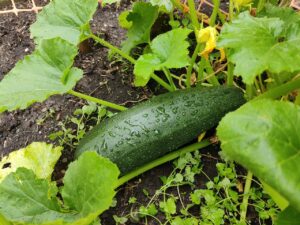Cultivating Eggplants: Tips for a Successful Homegrown Harvest
Eggplants are versatile, delicious, and nutritious vegetables that make a great addition to your home garden. I’ve had my share of successes and challenges while growing eggplants, and the satisfaction of harvesting homegrown produce is truly rewarding. In this comprehensive guide, we’ll explore how to grow eggplant from seeds, how to plant eggplant, and how to grow eggplant in a pot. We’ll also discuss harvesting eggplant and eggplant plant care to ensure a healthy and manageable harvest. By combining personal experiences and expert advice, this guide aims to support you in your eggplant-growing journey.
Varieties of Eggplant

There are many different varieties of eggplant to choose from, each with its unique flavour profile, shape, and colour. Some popular varieties include:
- Japanese Eggplant: A slender, elongated variety with deep purple skin and a mild, sweet flavour.
- Black Beauty Eggplant: Large, oval-shaped fruits with dark purple-black skin and creamy white flesh.
- Ichiban: Long, slender fruits with dark purple skin and tender flesh.
- Rosa Bianca: Medium-sized fruits with pink and white striped skin and a mild, sweet flavour.
Black Beauty Eggplant - Listada de Gandia: Large, oval fruits with white and purple striped skin and tender flesh.
How to Grow Eggplant from Seeds
Eggplants are best grown from seeds to ensure a healthy and strong plant. Follow these steps to start your eggplant journey:
- Choose the right variety: Select a suitable eggplant variety that thrives in your area. Popular varieties include Black Beauty, Ichiban, and Rosa Bianca.
- Plant seeds indoors: Start the seeds indoors 8-10 weeks before the last frost date. Use seed trays or small pots filled with seed-starting mix.
- Provide warmth and moisture: Place the trays in a warm location, ideally around 75°F (24°C). Keep the soil consistently moist, but not soaking wet.
- Germination: Eggplant seeds should germinate within 7-14 days.
- Transplant the seedlings: Once the seedlings have 2-3 true leaves, transplant them into larger pots to give them room to grow.
How to Plant Eggplant
- Harden off the seedlings: Acclimate the seedlings to outdoor conditions by gradually exposing them to sunlight and cooler temperatures over a week.
- Prepare the garden bed: Choose a sunny spot in your garden with well-draining soil. Amend the soil with compost and organic matter to improve fertility.
- Space the plants: Plant the eggplant seedlings 24-36 inches (60-90 cm) apart, with 36-48 inches (90-120 cm) between rows.
- Water and mulch: Water the plants deeply and apply a layer of mulch to help retain moisture and suppress weeds.
How to Grow Eggplant in a Pot
- Choose a suitable container: Select a pot that is at least 12 inches (30 cm) in diameter and has drainage holes.
- Use quality potting mix: Fill the container with a well-draining, fertile potting mix.
- Planting and spacing: Plant one eggplant per pot, ensuring adequate space for root growth.
- Provide support: Use a stake or cage to support the plant as it grows.
Harvesting Eggplant: When and How to Pick Your Eggplants
- Time to harvest: Eggplants are typically ready for harvest 16-24 weeks after planting, depending on the variety.
- Check for maturity: Harvest eggplants when their skin is glossy and the flesh is firm but slightly springy to the touch.
- Cutting technique: Use a sharp pair of pruning shears or a knife to cut the eggplant from the plant, leaving a short stem attached to the fruit.
Eggplant Plant Care: Watering, Fertilizing, and Pruning
- Watering: Keep the soil consistently moist, watering deeply and regularly, especially during hot weather.
- Fertilizing: Apply a balanced, slow-release fertilizer when planting, and follow up with a high-potassium liquid fertilizer every 2-3 weeks.
- Pruning: Remove any yellowing leaves and pinch off the growing tips to encourage bushier growth and better fruiting.
Eggplant Companion Plants
Eggplant companion planting is the practice of planting alongside other plants that can benefit its growth, improve soil health, and deter pests. Companion planting can help reduce the need for chemical pesticides and fertilizers while promoting a healthy ecosystem in your garden.
Herbs
- Basil: Basil is a popular herb that can help repel pests like aphids and spider mites. Additionally, basil’s strong scent can mask the scent of eggplant, making it less attractive to pests.
- Oregano: Oregano is another herb that can help repel pests like aphids and spider mites. Additionally, oregano can help improve soil health and attract beneficial insects like bees.
- Thyme: Thyme is a great herb for repelling pests like cabbage worms and tomato hornworms. It can also help improve soil health and attract beneficial insects like bees and butterflies.
- Parsley: Parsley is a good companion plant for eggplant, as it can help repel some harmful insects and attract beneficial insects like hoverflies and tachinid flies. Additionally, by adding nitrogen to the soil, parsley can help improve soil health.
Vegetables
- Peppers: Peppers are a good companion plant for eggplant, as they have similar growing requirements and can help repel pests like flea beetles and spider mites. The two plants complement each other well in cooking, making them a great combination for your garden.
- Tomatoes: Tomatoes are a popular companion plant for eggplant, as they can help improve soil health and deter pests. Tomatoes are known to repel hornworms, which can also damage eggplant plants.
- Beans: Beans are another good companion plant, as they can help fix nitrogen in the soil, which can benefit the growth of eggplant. Additionally, beans can attract pollinators like bees, which can help increase the fruit set on your plants.
Flowers
- Marigolds: Marigolds are another excellent companion plant, as they can repel nematodes and other soil-borne pests. Additionally, marigolds can attract beneficial insects like ladybugs and lacewings, which can help control aphids and other pests.
Eggplant companion planting is not only great for your garden; pollinators will appreciate it too!
Looking for garden seeds? You can see our varieties here: vegetable seeds, herb seeds, fruit seeds, and flower seeds.
Conclusion
Learning how to grow eggplant is a rewarding and enjoyable process that can lead to a bountiful harvest of delicious and versatile vegetables. By mastering the techniques of how to grow eggplant from seeds and how to plant eggplant in your garden, you set the foundation for a thriving crop. For those with limited space, knowing how to grow eggplant in a pot can provide an opportunity to enjoy homegrown produce even in small areas. Incorporating eggplant companion plants into your garden plan can help boost growth and control pests, while following proper harvesting eggplant techniques ensures you reap the benefits of your hard work. Finally, diligent eggplant plant care, including watering, fertilizing, and pruning, is essential for maintaining the health and productivity of your plants. By following these guidelines, you’ll be well-equipped to enjoy the satisfaction and culinary delights that come with growing your own eggplants.







